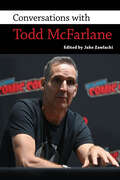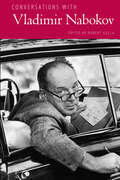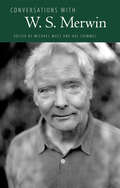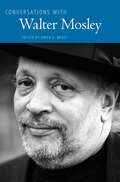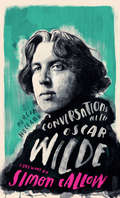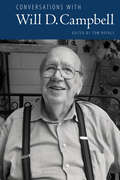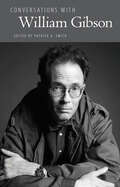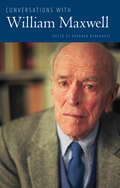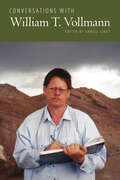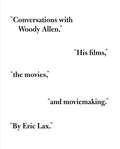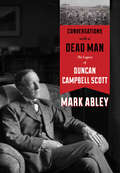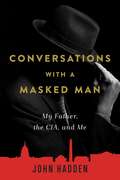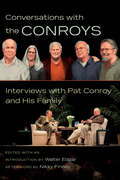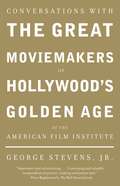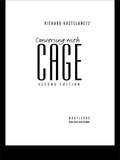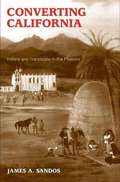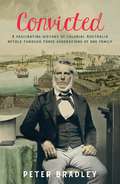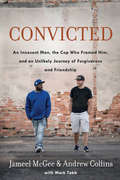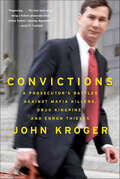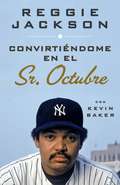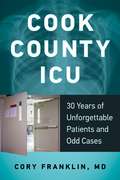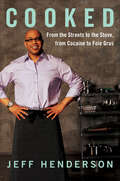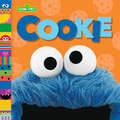- Table View
- List View
Conversations with Todd McFarlane (Conversations with Comic Artists Series)
by Jake ZawlackiOver thirty years after his initial ascent to super stardom, Todd McFarlane (b. 1961) remains one of the most popular and contentious comic artists ever. The interviews compiled in this volume offer a nuanced portrait of McFarlane’s polarizing character. Beginning with his earliest days on Spider-Man to the months before the hotly anticipated release of Spawn and ending with his writing ventures decades later, the interviews offer compelling perspectives from the renowned creator.As the most vocal representative of Image Comics, McFarlane, alongside Jim Lee, Rob Liefeld, Erik Larsen, Jim Valentino, Marc Silvestri, and Whilce Portacio, was a veritable rock star. Eager fans swarmed into lengthy lines around comic book stores and conventions, waiting for their chance at a thirty-second autograph. This book offers a glimpse into the comic book world of the early 1990s, a world rampant with variant covers, impossibly exaggerated bodies, and wild speculation about what would be the next comic to explode in value. The volume also includes the momentous public debate between McFarlane and Peter David, former collaborator on The Incredible Hulk, moderated by the late George Pérez at a standing-room-only event at ComicsFest in 1993. While this world sounds almost inconceivable to the comic book fan of today, it was the milieu in which McFarlane rose to stardom and excelled like no other, leaving his mark on the medium forever.
Conversations with Vladimir Nabokov (Literary Conversations Series)
by Robert GollaConversations with Vladimir Nabokov brings together candid, revealing interviews with one of the twentieth century’s master prose writers. Vladimir Nabokov (1899–1977) was a Russian American scientist, poet, translator, and professor of literature. Critics throughout the world celebrated him for developing the luminous and enigmatic style that advanced the boundaries of modern literature more than any author since James Joyce. In a career that spanned over six decades, he produced dozens of iconic works, including Lolita, Pale Fire, Ada, and his classic autobiography, Speak, Memory.The twenty-eight interviews and profiles in this collection were drawn from Nabokov’s numerous print and broadcast appearances over a period of nineteen years. Beginning with the controversy surrounding the American publication of Lolita in 1958, he offers trenchant, witty views on society, literature, education, the role of the author, and a range of other topics. He discusses the numerous literary and symbolic allusions in his work, his use of parody and satire, as well as analyses of his own literary influences.Nabokov also provided a detailed portrait of his life—from his aristocratic childhood in prerevolutionary Russia, education at Cambridge, apprenticeship as an émigré writer in the capitals of Europe, to his decision in 1940 to immigrate to the United States, where he achieved renown and garnered an international readership. The interviews in this collection are essential for seeking a clearer understanding of the life and work of an author who was pivotal in shaping the landscape of contemporary fiction.
Conversations with W. S. Merwin (Literary Conversations Series)
by Michael Wutz and Hal CrimmelConversations with W. S. Merwin is the first collection of interviews with former United States Poet Laureate W. S. Merwin (b. 1927). Spanning almost six decades of conversations, the collection touches on such topics as Merwin's early influences (Robert Graves and Ezra Pound), his location within the twin poles of Walt Whitman and Henry David Thoreau, and his extraordinary work as a translator, as well as his decades-long interest in environmental conservation. Anticipating the current sustainability movement and the debates surrounding major and minor literatures, Merwin was, and still is, a visionary.He is among the most distinguished poets, translators, and thinkers in the United States. A major link between the period of literary modernism and its contemporary extensions, Merwin has been a force in American letters for many decades, and his translations from the Spanish, French, Italian, Japanese, and other languages have earned him unanimous praise and admiration. Merwin also wrote at the forefront of literature's environmental advocacy and early on articulated concerns about ecology and sustainability.Conversations with W. S. Merwin offers insight into the various dimensions of Merwin's thought by treating his interviews as a self-standing category in his oeuvre. More than casual narratives that interpret the occasional poem or relay an occasional experience, they afford literary and cultural historians a view into the larger throughlines of Merwin's thinking.
Conversations with Walter Mosley (Literary Conversations Series)
by Owen E. BradyThe interviews in this collection cover Walter Mosley's career and reveal an overarching theme: a belief in the transformative power of reading and writing. Since the 1990 publication of his first novel, Devil in a Blue Dress, Mosley (b. 1952) has published over thirty books in a tremendous range of genres and modes: crime and detective fiction, science fiction, literary novels of ideas, character studies, political and social nonfiction, erotica, and memoir. Best known for his Easy Rawlins detective series and Socrates Fortlow series of crime novels, Mosley has created a body of work that as a whole chronicles and examines twentieth-century African American experience. Conversations with Walter Mosley covers the breadth of Mosley's career and reveals a craftsman and wryly witty conversationalist. Conscious of his forebears as well as literary techniques, he discusses favorites and influences including Camus, Shakespeare, and Dickens as well as writers in popular genres—especially speculative fiction and the hard-boiled noir detective tradition. He also discusses how his work modifies the crime tradition to engage it with black experience.
Conversations with Wilde: A Fictional Dialogue Based on Biographical Facts (Conversations With #3)
by Merlin HollandImagined by Oscar Wilde's own grandson, this fictionalised conversation presents the essential biography of the poet, playwright and gay martyr.Renowned for his endlessly quotable pronouncements, Oscar Wilde cut a dashing figure in late Victorian London ... until his tragic downfall resulting from an ill-judged libel action. We remember him not only for his famous trial and imprisonment, but also for a "devil's dictionary" of timeless aphorisms and for the enduring brilliance of plays such as The Importance of Being Earnest. Wilde's life resembles his early short story, "The Remarkable Rocket", which, rising from nowhere in a shower of sparks, explodes and falls to earth, exclaiming as it goes out, "I knew I should create a great sensation." Merlin Holland expertly traces the arc of his illustrious ancestor's life, from his birth in Dublin in 1854 as Oscar Fingal O'Flahertie Wills Wilde, to a brilliant career at Oxford University where his reputation for dandyish wit was first honed, through to his conquest of the drawing rooms and theatres of fashionable London, culminating in disgrace and imprisonment at the hands of the Marquess of Queensberry in the most notorious libel trial in English history. Wilde died in penury and obscurity in 1900, yet his reputation today has never been greater. This engaging and innovative short book features a concise biographical essay on Wilde's meteoric career, followed by a Q&A interview based on Wilde's own words and Merlin Holland's unrivalled knowledge of his grandfather's life, work and puckish observations. This sparkling biography does full justice to Oscar Wilde's writerly genius and irrepressible humanity. It offers readers a renewed appreciation for a man who at times scadalised his era as much as he delights our own.
Conversations with Will D. Campbell (Literary Conversations Series)
by Tom RoyalsConversations with Will D. Campbell is the first collection of interviews with the southern preacher, activist, and author best known for his involvement with the civil rights movement. Ranging from a 1971 discussion about religion and ending with a previously unpublished interview conducted in 2009, these twelve interviews give insight to Campbell's unique religious beliefs and highlight pivotal moments of his career.Will D. Campbell (1924-2013) was born poor in rural Mississippi and became an ordained minister when he was barely seventeen years old. After serving in the Army during World War II, Campbell ministered in a variety of positions, including a pastorate in Louisiana, as religious director at the University of Mississippi, and as a race relations consultant for the National Council of Churches. Along the way, Campbell worked with civil rights figures, Klansmen, Black Panthers, and country music icons, believing all were equal in the eyes of God. Throughout his career, Campbell drew attention for criticizing the institutional churches and supporting women's rights, gay rights, and school desegregation.From 1962 through 2012, Campbell published over fifteen books including novels, biographies, and memoirs. His first book, Race and the Renewal of the Church, introduced his theories of reconciliation and the failures of institutional churches. His best-known work, Brother to a Dragonfly, was a National Book Award finalist.
Conversations with William Gibson (Literary Conversations Series)
by Patrick A. Smith“After reading Neuromancer for the first time,” literary scholar Larry McCaffery wrote, “I knew I had seen the future of [science fiction] (and maybe of literature in general), and its name was William Gibson.” McCaffery was right. Gibson's 1984 debut is one of the most celebrated SF novels of the last half century, and in a career spanning more than three decades, the American-Canadian science fiction writer and reluctant futurist responsible for introducing “cyberspace” into the lexicon has published nine other novels. Editor Patrick A. Smith draws the twenty-three interviews in this collection from a variety of media and sources—print and online journals and fanzines, academic journals, newspapers, blogs, and podcasts. Myriad topics include Gibson's childhood in the American South and his early adulthood in Canada, with travel in Europe; his chafing against the traditional SF mold, the origins of “cyberspace,” and the unintended consequences (for both the author and society) of changing the way we think about technology; the writing process and the reader's role in a new kind of fiction. Gibson (b. 1948) takes on branding and fashion, celebrity culture, social networking, the post-9/11 world, future uses of technology, and the isolation and alienation engendered by new ways of solving old problems. The conversations also provide overviews of his novels, short fiction, and nonfiction.
Conversations with William Maxwell (Literary Conversations Series)
by Barbara BurkhardtConversations with William Maxwell collects thirty-eight interviews, public speeches, and remarks that span five decades of the esteemed novelist and New Yorker editor’s career. The interviews collectively address the entirety of Maxwel’s literary work—with in-depth discussion of his short stories, essays, and novels including They Came Like Swallows, The Folded Leaf, and the American Book Award–winning So Long, See You Tomorrow—as well as his forty-year tenure as a fiction editor working with such luminaries as John Updike, John Cheever, Eudora Welty, Vladimir Nabokov, and J.D. Salinger. Maxwell’s words spoken before a crowd, some previously unpublished, pay moving tribute to literary friends and mentors, and offer reflections on the artistic life, the process of writing, and his midwestern heritage. All retain the reserved poignancy of his fiction. The volume publishes for the first time the full transcript of Maxwell’s extensive interviews with his biographer and, in an introduction, correspondence with writers including Updike and Saul Bellow, which enlivens the stories behind his interviews and appearances.
Conversations with William T. Vollmann (Literary Conversations Series)
by Daniel LukesAcross fiction, journalism, ethnography, and history, William T. Vollmann’s oeuvre—which includes a “prostitution trilogy,” a septology (Seven Dreams) about encounters between first North Americans and European colonists, and a more-than-three-thousand-page philosophical treatise on violence—is as ambitious as it is dazzling. Conversations with William T. Vollmann collects twenty-nine interviews, from early press coverage in Britain where his career first took flight, to in-depth visits to his writing and art studio in Sacramento, California. Throughout these conversations, Vollmann (b. 1959) speaks with candor and wit on such subjects as grief and guilt in his work, his love of guns and his experience of war, the responsibilities of the artist as witness, the benefits of looking out into the world beyond the confines of one’s horizon, the limitations of what literature can achieve, and how we can speak to the future. Bringing to the fore several expanded, unpublished, and hard-to-find interviews, this volume offers a valuable set of perspectives on a uniquely rewarding and sometimes overwhelming writer. On the road promoting his books or in a domestic setting, Vollmann comes across as reflective and humane, humble in his craft despite deep dedication to his uncompromising vision, and ever armed with a spirit of mischief and capacity to shock and unsettle the reader.
Conversations with Woody Allen
by Eric LaxFrom the author of the best-selling biography Woody Allen--the most informative, revealing, and entertaining conversations from his thirty-six years of interviewing the great comedian and filmmaker.For more than three decades, Woody Allen has been talking regularly and candidly with Eric Lax, and has given him singular and unfettered access to his film sets, his editing room, and his thoughts and observations. In discussions that begin in 1971 and continue into 2007, Allen discusses every facet of moviemaking through the prism of his own films and the work of directors he admires. In doing so, he reveals an artist's development over the course of his career to date, from joke writer to standup comedian to world-acclaimed filmmaker.Woody talks about the seeds of his ideas and the writing of his screenplays; about casting and acting, shooting and directing, editing and scoring. He tells how he reworks screenplays even while filming them. He describes the problems he has had casting American men, and he explains why he admires the acting of (among many others) Alan Alda, Marlon Brando, Michael Caine, John Cusack, Judy Davis, Robert De Niro, Leonardo DiCaprio, Mia Farrow, Gene Hackman, Scarlett Johansson, Julie Kavner, Liam Neeson, Jack Nicholson, Charlize Theron, Tracey Ullman, Sam Waterston, and Dianne Wiest. He places Diane Keaton second only to Judy Holliday in the pantheon of great screen comediennes.He discusses his favorite films (Citizen Kane is the lone American movie on his list of sixteen "best films ever made"; Duck Soup and Airplane! are two of his preferred "comedian's films"; Trouble in Paradise and Born Yesterday among his favorite "talking plot comedies"). He describes himself as a boy in Brooklyn enthralled by the joke-laden movies of Bob Hope and the sophisticated film stories of Manhattan. As a director, he tells us what he appreciates about Bergman, De Sica, Fellini, Welles, Kurosawa, John Huston, and Jean Renoir. Throughout he shows himself to be thoughtful, honest, self-deprecating, witty, and often hilarious.Conversations with Woody Allen is essential reading for everyone interested in the art of moviemaking and for everyone who has enjoyed the films of Woody Allen.From the Hardcover edition.
Conversations with a Dead Man
by Mark AbleyAs a poet and citizen deeply concerned by the Oka Crisis, the Idle No More protests, and Canada's ongoing failure to resolve First Nations issues, Montreal author Mark Abley has long been haunted by the figure of Duncan Campbell Scott, known both as the architect of Canada's most destructive Aboriginal policies and as one of the nation's major poets. Who was this enigmatic figure who could compose a sonnet to an "Onondaga Madonna" one moment and promote a "final solution" to the "Indian problem" the next? In this passionate, intelligent and highly readable inquiry into the state of Canada's troubled Aboriginal relations, Abley alternates between analysis of current events and an imagined debate with the spirit of Duncan Campbell Scott, whose defense of the Indian Residential School and belief in assimilation illuminate the historical roots underlying today's First Nations' struggles.
Conversations with a Masked Man: My Father, the CIA, and Me
by John HaddenFor forty years John Hadden and his father of the same name fought at the dinner table over politics, art, and various issues concerning America. One was haunted by what he had witnessed during his long CIA career, from Berlin to Tel Aviv; the other retreated to the Vermont woods to direct Shakespeare until finally he confronted his father at the table one last time with a tape recorder. Conversations with a Masked Man is a series of conversations Hadden had with his father about the older man's thirty-year career as a CIA officer and how American policy affected the family and the world. Father and son talk about John senior's early life as a kid in Manhattan, his training at West Point, the stench of bodies in Dresden after the war, Berlin and Vienna in the late forties and fifties at the height of the Cold War, the follies of the Cuban missile crisis, how he disobeyed orders to bomb Cairo while he was station chief in Israel during the Six-Day War, and treacherous office politics in Washington. The story unfolds in dialogue alternating with the writer's own memories and reflections. What emerges is hilarious, unexpectedly candid, and deeply personal. Combining the candid descriptions of the world of the CIA with intimate conversations between a father and son, this book is written for the political junkie, the psychologist, the art lover, or anybody who wonders who the hell their father really is.
Conversations with the Conroys: Interviews with Pat Conroy and His Family
by Nikky Finney“Portrays a deeply troubled family struggling to survive amidst terrifying abuse . . . a page-turner, as engrossing as any of Conroy’s novels.” —Robert H. Brinkmeyer Jr., University of South CarolinaA New York Times–bestselling author of eleven novels and memoirs, Pat Conroy is one of America’s most beloved storytellers and a writer as synonymous with the South Carolina lowcountry as pluff mud or the Palmetto tree. As Conroy’s writings have been rooted in autobiography more often than not, his readers have come to know and appreciate much about the once-secret dark familial history that has shaped Conroy’s life and work.Conversations with the Conroys opens further the discussion of the Conroy family through five revealing interviews conducted in 2014 with Pat Conroy and four of his six siblings: brothers Mike, Jim, and Tim and sister Kathy. In confessional and often comic dialogs, the Conroys openly discuss the perils of being raised by their larger-than-life parents, USMC fighter pilot Col. Don Conroy (the Great Santini) and southern belle Peggy Conroy (née Peek); the complexities of having their history of abuse made public by Pat’s books; the tragic death of their youngest brother, Tom; the chasm between them and their sister Carol Ann; and the healing, redemptive embrace they have come to find over time in one another. With good humor and often-striking candor, these interviews capture the Conroys as authentic and indeed proud South Carolinians, not always at ease with their place in literary lore, but nonetheless deeply supportive of Pat in his life and writing.“[A] small gem of a book . . . For fans of Conroy’s books, this is a must-read.” —Publishers Weekly
Conversations with the Great Moviemakers of Hollywood's Golden Age: At the American Film Institute
by George Stevens Jr.The first book to bring together these interviews of master moviemakers from the American Film Institute's renowned seminars,Conversations with the Great Moviemakers offers an unmatched history of American cinema in the words of its greatest practitioners. Here are the incomparable directors Frank Capra, Elia Kazan, King Vidor, David Lean, Fritz Lang ("I learned only from bad films"), William Wyler, and George Stevens; renowned producers and cinematographers; celebrated screenwriters Ray Bradbury and Ernest Lehman; as well as the immortal Ingmar Bergman and Federico Fellini ("Making a movie is a mathematical operation. It's absolutely impossible to improvise"). Taken together, these conversations offer uniquely intimate access to the thinking, the wisdom, and the genius of cinema's most talented pioneers.
Conversing with Cage
by Richard KostelanetzFirst Published in 2003. Routledge is an imprint of Taylor & Francis, an informa company.
Converting California: Indians and Franciscans in the Missions
by James SandosThis book is a compelling and balanced history of the California missions and their impact on the Indians they tried to convert.
Converting the West: A Biography of Narcissa Whitman
by Julie Roy Jeffrey(Summarized from the inside cover) Narcissa Whitman and her husband, Marcus, were pioneer missionaries to the Oregon Territory in the 1830s. She grew up in western New York State. Her values and attitudes carefully shaped by the mother and the Second Great Awakening. She eagerly embraced the evangelical missionary movement. Following her marriage to Marcus, she traveled overland to Oregon, where she enthusiastically began hoping to see many "benighted" Indians adopt her message of salvation through Christ.<P><P> But not one Indian ever did. Cultural barriers that Narcissa never grasped effectively kept her far from the Cayuse. Gradually abandoning her efforts with the Indians, Narcissa developed a more satisfying ministry. She taught and counseled whites' emigrants streaming into the territory, on the mission compound. These emigrants posed an increasing threat to the Indians. The Cayuse ultimately took murderous action against the Whitmans', the most visible whites, thus ending dramatically Narcissa's eleven-year effort to be a faithful Christian missionary as well as a devoted wife and loving mother. In this moving biography, Jeffreys' brings Narcissa Whitman to life, revealing not only white assumptions and imperatives but the perspective of the Cayuse tribe as well. Jeffrey draws on a rich assortment of primary and secondary materials, blending narration and interpretation in her account. She clearly traces the motivations and relationships, the opportunities and constraints that structured Narcissa Whitman's life as a nineteenth-century American evangelical woman.
Convicted
by Peter BradleyA unique history of Australia retold through the extraordinary lives of Peter Bradley&’s three ancestors: a father, son and grandson. James Bradley was a First Fleet convict found guilty of stealing a white linen handkerchief worth two shillings, and sentenced to seven years transportation to Australia. Joseph Bradley worked his life in the most dangerous occupation of the time – whaling – and despite his parents being uneducated and illiterate went on to write a journal about his experiences, rich in history and insight. Roland Bradley was a man of unionism and politics, and like his father and grandfather took up the fight against the rich and powerful through his involvement with the early Maritime union. In 1894, he wrote an account of surviving the shipwreck of the SS Kanahooka, which forced its inhabitants to wander the wilderness of North Queensland for 18 days. Following the early struggles of a fledgling colony to nationhood, Convicted is an engrossing and highly imaginative retelling of the story of one family, entwined with the history of this country from the landing of the First Fleet in 1788.
Convicted: A Crooked Cop, an Innocent Man, and an Unlikely Journey of Forgiveness and Friendship
by Andrew Collins Mark Tabb Jameel Zookie McgeeJameel McGee: “For the next three years not a day went by that I didn’t think about my son who I had never seen and the cop who had kept me from him. And for most of those three years I promised myself that if I ever saw this cop again, I was going to kill him. I intended to keep that promise.” Andrew Collins: “I watched this angry man march through a crowd, a little boy and another man struggling to keep up with him....The man walked straight up to me, stopped, and stuck out his hand. I took it. “Remember me?” he asked in a tone that sounded more like a threat than a question. Somehow, a name came to me. ‘Jameel McGee,’ I replied.” It reads like a gripping crime novel…except this story really happened. Racial tensions had long simmered in Benton Harbor, a small city on the eastern shore of Lake Michigan, before the day a white narcotics officer--more focused on arrests than justice—set his sights on an innocent black man. But when officer Andrew Collins framed Jameel McGee for possession of crack cocaine, the surprising result was not a race riot but a transformative journey for both men. Falsely convicted, McGee spent four years in federal prison. Collins also went to prison a few years later for falsifying police reports. While behind bars, the faith of both men deepened. But the story took its most unexpected turn once they were released--when their lives collided again in a moment brimming with mistrust and anger. The two were on a collision course—not to violence—but forgiveness. As current as today’s headlines, this explosive, true story reveals how these radically conflicted men chose to let go of fear and a thirst for revenge to pursue reconciliation for themselves, their community, and our racially divided nation.
Convictions: A Prosecutor's Battles Against Mafia Killers, Drug Kingpins, and Enron Thieves
by John KrogerConvictions is a spellbinding story from the front lines of the fight against crime. Most Americans know little about the work of assistant United States attorneys, the federal prosecutors who possess sweeping authority to investigate and prosecute the nation's most dangerous criminals. John Kroger pursued high-profile cases against Mafia killers, drug kingpins, and Enron executives. Starting from his time as a green recruit and ending at the peak of his career, he steers us through the complexities of life as a prosecutor, where the battle in the courtroom is only the culmination of long and intricate investigative work. He reveals how to flip a perp, how to conduct a cross, how to work an informant, how to placate a hostile judge. Kroger relates it all with a novelist's eye for detail and a powerful sense of the ethical conflicts he faces. Often dissatisfied with the system, he explains why our law enforcement policies frequently fail in critical areas like drug enforcement and white-collar crime. He proposes new ways in which we can fight crime more effectively, empowering citizens to pressure their lawmakers to adopt more productive policies. This is an unflinching portrait of a crucial but little-understood part of our justice system, and Kroger is an eloquent guide.
Convirtiendome en el Sr. Octubre
by Reggie JacksonLos Yankees de Nueva York versus los Red Sox de Boston, septiembre 1977: ¿Le pides a Babe Ruth que toque la bola, o a Cookie Lavagetto, Willie McCovey o Phil Rizzuto? Pero yo estaba aprendiendo. Billy Martin me dijo que tocara la bola y me preparé para hacerlo. Pero Reggie Cleveland me lanzó una bola hacia adentro y no pude sacar el bate, así que tuve que tomarla como una bola. Miré a Dick Howser y el toque de bola quedó descartado. Cleveland me lanzó una bola rápida y cometí un foul. Miré de nuevo a Howser. Volvió a hacerme señas para tocar la bola. Díganme una cosa, ¿tiene sentido eso? Me preparé para tratar de tocar la bola de nuevo, pero Reggie Cleveland me lanzó otra bola hacia adentro. Era como si ellos estuvieran viendo las señas, lo cual era muy probable. Era como si supieran con antelación que iba a intentar tocar la bola. Personalmente, pensé que estaban cometiendo un error. Si fuera mi equipo y Reggie Jackson quería tocar la bola, yo le dejaría hacerlo. Pero la cuenta se puso a mi favor, el toque de bola quedó descartado y Cleveland me lanzó una bola deslizadora. Me lo pusieron muy fácil. El resto es historia.
Convirtiendome en el Sr. Octubre
by Reggie JacksonLos Yankees de Nueva York versus los Red Sox de Boston, septiembre 1977: ¿Le pides a Babe Ruth que toque la bola, o a Cookie Lavagetto, Willie McCovey o Phil Rizzuto? Pero yo estaba aprendiendo. Billy Martin me dijo que tocara la bola y me preparé para hacerlo. Pero Reggie Cleveland me lanzó una bola hacia adentro y no pude sacar el bate, así que tuve que tomarla como una bola. Miré a Dick Howser y el toque de bola quedó descartado. Cleveland me lanzó una bola rápida y cometí un foul. Miré de nuevo a Howser. Volvió a hacerme señas para tocar la bola. Díganme una cosa, ¿tiene sentido eso? Me preparé para tratar de tocar la bola de nuevo, pero Reggie Cleveland me lanzó otra bola hacia adentro. Era como si ellos estuvieran viendo las señas, lo cual era muy probable. Era como si supieran con antelación que iba a intentar tocar la bola. Personalmente, pensé que estaban cometiendo un error. Si fuera mi equipo y Reggie Jackson quería tocar la bola, yo le dejaría hacerlo. Pero la cuenta se puso a mi favor, el toque de bola quedó descartado y Cleveland me lanzó una bola deslizadora. Me lo pusieron muy fácil. El resto es historia.
Cook County ICU: 30 Years of Unforgettable Patients and Odd Cases
by Cory FranklinAn inside look at one of the nation's most famous public hospitals, Cook County, as seen through the eyes of its longtime Director of Intensive Care, Dr. Cory Franklin. Filled with stories of strange medical cases and unforgettable patients culled from a thirty-year career in medicine, Cook County ICU offers readers a peek into the inner workings of a hospital. Author Dr. Cory Franklin, who headed the hospital’s intensive care unit from the 1970s through the 1990s, shares his most unique and bizarre experiences, including the deadly Chicago heat wave of 1995, treating some of the first AIDS patients in the country before the disease was diagnosed, the nurse with rare Munchausen syndrome, the first surviving ricin victim, and the famous professor whose Parkinson’s disease hid the effects of the wrong medication. Surprising, darkly humorous, heartwarming, and sometimes tragic, these stories provide a big-picture look at how the practice of medicine has changed over the years, making it an enjoyable read for patients, doctors, and anyone with an interest in medicine.
Cooked: From Streets to the Stove, From Cocaine to Foie Gras
by Jeff HendersonBy twenty-one, Jeff Henderson was making up to $35,000 a week cooking and selling crack cocaine. By twenty-four, he had been sentenced to nineteen and a half years in prison on federal drug trafficking charges. It was an all-too-familiar story for a young man raised on the streets of South Central LA. But what happened next wasn't.Once inside prison, Jeff Henderson worked his way up from dishwasher to chief prison cook, and when he was released in 1996, he had found his passion and his dream—he would become a professional chef. Barely five years out of federal prison, he was on his way to becoming an executive chef, as well as being a sought-after public speaker on human potential and a dedicated mentor to at-risk youth. A window into the streets and the fast-paced kitchens of world-renowned restaurants, Cooked is a very human story with a powerful message of commitment, redemption, and change.
Cookie (Sesame Street Friends)
by Andrea Posner-SanchezMeet your favorite Sesame Street friends in this adorable photographic book!Learn all about Cookie Monster in a new Sesame Street board book illustrated with bold, bright photographs. As they pore over the many sturdy pages, babies and toddlers will be delighted to see what Cookie likes to do: play with friends, dance, bake cookies, EAT cookies, and much more. It's a book they'll go back to again and again.Sesame Workshop, the nonprofit educational organization behind Sesame Street, aims to help kids grow smarter, stronger, and kinder through its many unique domestic and international initiatives. These projects cover a wide array of topics for families around the world. Sesame Street is the most trusted name in early learning.
